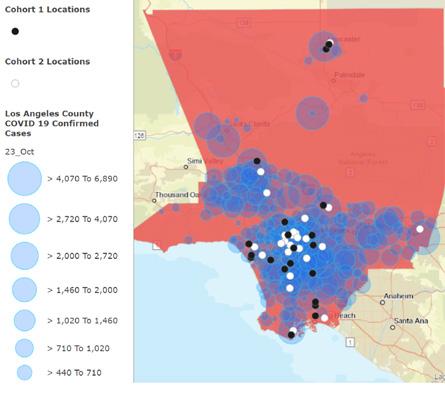
4 minute read
COVID-19 Pandemic and Pivots to Remote Service Delivery
On March 19, 2020, Governor Gavin Newsom issued a statewide “Stay at Home” order in response to the rapidly escalating spread of the COVID-19 virus across California. The order, as well as ensuing economic and community concerns, necessitated adjustments to many of the services delivered by R2R grantees.
COVID-19 related restrictions went into effect nine months into Cohort 1’s grant period (75% complete) and three months into Cohort 2’s grant period (17% complete). Grantees were given an opportunity to make modifications to their R2R budgets (within the existing scope of work) to meet new and emerging needs of youth and their families as schools, businesses, and many workplaces temporarily or permanently closed their doors.
Effects of COVID-19 on Service Delivery
When the pandemic started, Cohort 1 grantees had significantly less funding and less time remaining in their grant period to adjust their service delivery than Cohort 2. The 20 grantees in Cohort 1 were steadily increasing the number of youth served and program touchpoints, but as the onset of the COVID-19 pandemic became more pronounced in Los Angeles, the counts of youth served dropped in both March and April of 2020. Grantees successfully began to pivot to remote services in May 2020 and rebounded to achieve pre-pandemic numbers in June 2020, demonstrating their resiliency. Despite the pandemic, grantees increased their average number of program touchpoints per youth as the extent of disruption to normal social functioning became more apparent.
Grantee Insights: Serving Youth in a Pandemic
While youth enrolled in school have been to continue to pursue their studies online, many of our youth have suffered losses or reduced employment due to COVID-19. Also, due to COVID-19 the court may be closed and/or court dates have been postponed/delayed, which has hindered our youths’ ability to complete their probation or parole successfully.
- Coalition for Engaged Education
The services we provide in an in-person setting were affected to some degree. The organization had to quickly adapt to supporting youth on virtual formats. We scheduled modules, college/financial aid support, and employment application assistance via Zoom, phone calls, and messaging applications.
– Long Beach BLAST
Due to Covid-19 social distancing mandates, services were limited strictly to online during the April to June 2020 quarter. In efforts to maintain a sense of social connection and community between students and between students and staff, we began hosting a weekly Game Night, in which students checked in with other students and staff, sharing about how they have been coping with staying home from school and social distancing in general, and played various Zoom-based games, such as Jeopardy, Pictionary, Trivia, etc. We continued Games Nights throughout the quarter.
We continued to provide online one-on-one tutoring to students throughout the quarter, to help them with their school assignments and supplemental materials [to prevent] learning loss. In May, in partnership with JUICE [Justice by Uniting in Creative Energy], we started a weekly online Hip Hop class to provide youth additional ways to stay connected with one another, provide opportunity for physical exercise, learn new artistic/cultural skills, and develop mentoring relationships with the instructors.
- Koreatown Youth and Community Center
Like most programs, [Amazing Grace Covservatory] AGC’s programming was completely disrupted by the impact of COVID-19. In addition to [large performances, graduation, and a planned New York trip through Education First for 30 youth being cancelled], there was a tremendous financial impact. Our graduating seniors were certainly the most impacted—no culminating performance or senior moments at school or AGC, no New York trip to see plays on Broadway. Many of our seniors had been with the program for as long as 10 years; this, for them, was their moment.
– Amazing Grace Conservatory
[When] our standard programming (afterschool classic car restoration) had been cancelled due to COVID-19 we switched to a meal distribution and essential supplies program. We have been slowly implementing a de facto training and mentorship program with older youth (17-18 years) who are allowed to work and train at the shop and in our offices on a limited trial basis, which is conditioned on completion of high school credits, GED, obtaining valid driver license, etc.
– Lost Angels Children’s Project
Cohort 1 and Cohort 2: Youth Served and Program Touchpoints by Month
It is estimated that between March 2020 and June 2020, R2R grantees provided COVID-19 support services to nearly 30,000 additional community members (youth and their families) through 100,000 different touch points.
Cohort 1 Youth Served Cohort 1 Program Touchpoints Cohort 2 Youth Served Cohort 2 Program Touchpoints
Pivots to Service Delivery – Cohort 1 and Cohort 2
Most of the grantee organizations shifted primary service delivery to online platforms and closed, or partially, closed their offices beginning in March 2020. Out of the 49 organizations participating across Cohort 1 and Cohort 2, ten organizations from Cohort 1 and ten organizations from Cohort 2 were also able to deliver COVID-19-related support services to youth and their families, in addition to the youth-specific activities they had originally planned.
Imoyase collected data on the types of COVID-19 support activities provided by grantees to community members, which broadly fell into six categories: • Food provided or delivered • Technology provided or delivered • Technology support provided • Healthcare supplies (e.g., personal protective equipment [PPE] and hand sanitizer) provided • Case management provided (e.g., wellness checks) • Other specific needs



